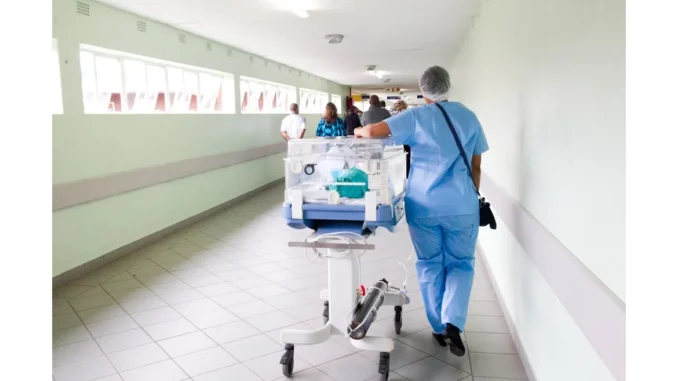
In the rapidly evolving sphere of healthcare innovation, certain developments stand out as significant milestones. Recently, I had the privilege of conversing with Dr Oliver Bennett, an esteemed authority in biotechnology and medical innovation, about an impactful advancement: ECS’s recent $96 million contract with the Department of Health and Human Services’ Advanced Research Projects Agency for Health (ARPA-H). This contract, which focuses on biotechnology and medical innovation, follows an impressive $500 million agreement ECS secured earlier in the year, highlighting the company’s growing influence in the healthcare sector.
Dr Bennett, an astute observer of the changing landscape in healthcare technology, was quick to stress the importance of ECS’s collaboration with ARPA-H. “The involvement of ECS in this initiative,” he began, “signifies a pivotal transition in our approach to healthcare solutions on a national scale. Their engagement with the ARPA-H mission offices of Health Science Futures (HSF) and Scalable Solutions (SSO) is not merely a triumph for ECS but a beacon of progress for healthcare innovation.” His words underscored the transformative potential this partnership holds for the future of healthcare.
The dialogue naturally shifted to the objectives of ARPA-H and the strategic role ECS plays in supporting them. “ARPA-H is renowned for its boundary-pushing endeavours,” Dr Bennett explained, “particularly in fields such as biotechnology, neuroscience, and regenerative medicine. ECS’s proficiency in IT systems integration, coupled with a focus on data and AI, cybersecurity, and enterprise transformation solutions, positions them ideally to tackle the scalability challenges faced by these mission offices.” ECS is not only offering programme support services but also engaging in thought leadership, thereby actively shaping the future of healthcare through strategic planning and advisory support. This comprehensive approach aims to enhance the effectiveness and reach of ARPA-H’s initiatives.
Our discussion also explored ECS’s past achievements and how these have paved the way for this new venture. “Earlier this year, ECS secured a $500 million indefinite delivery/indefinite quantity (IDIQ) contract,” Dr Bennett remarked, “which was a significant accomplishment. This foundational contract allowed ECS to cultivate a strong rapport with government agencies and establish a reputation for delivering robust solutions.” He noted that the success of the $500 million STATS contract effectively set the stage for the new $96 million agreement, showcasing ECS’s ability to manage large-scale projects and their commitment to advancing healthcare solutions.
Dr Bennett expressed particular enthusiasm about the transformative potential of ECS’s contributions. “What excites me,” he said, eyes shining with optimism, “is the transformative potential of the ongoing work. The HSF office, for example, is devoted to eliminating scientific and technological barriers. By accelerating advancements across various research domains, they support cutting-edge programmes that could revolutionise our approach to healthcare.” This focus on innovation and progress is integral to ECS’s mission and aligns perfectly with ARPA-H’s goals of fostering groundbreaking developments.
We then delved into the broader implications for healthcare access and equity, an area Dr Bennett was keen to explore. “One of the most pressing challenges in healthcare today is ensuring innovative solutions are accessible and affordable,” he stressed. “The SSO office within ARPA-H is tackling this challenge directly, and ECS’s involvement is vital in developing solutions that can be scaled to meet the diverse needs of the population.” This commitment to accessibility highlights the importance of strategic partnerships in addressing the complex issues facing modern healthcare.
As our conversation concluded, I asked Dr Bennett about his vision for the future of healthcare innovation. “ECS’s partnership with ARPA-H is a significant step forward,” he responded thoughtfully. “It represents a shift towards more collaborative and dynamic approaches to healthcare challenges. By leveraging technology and fostering innovation, we can hope to see a future where healthcare is not only advanced but also equitable and sustainable.” His insight encapsulated the broader aspirations of those involved in this pivotal moment in healthcare development.
Reflecting on the interview, it is apparent that ECS’s recent contract with ARPA-H transcends a mere business transaction; it represents a commitment to driving transformative change within the healthcare sector. As ECS continues to expand its influence, the aspiration is that their efforts will culminate in tangible improvements in health outcomes, not only in the United States but potentially on a global scale. The enthusiasm and insights shared by Dr Bennett underscore the significance of this moment in healthcare innovation, serving as a reminder that collaboration and vision are central to the pursuit of progress. As we look to the future, the work being undertaken by ECS and ARPA-H is a testament to the power of strategic partnerships in shaping a healthier world for all.


Be the first to comment